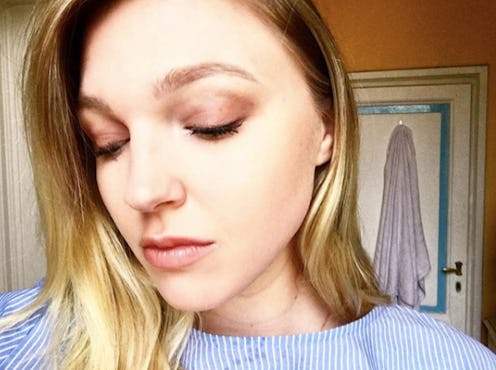
When I was growing up, I thought of clearing my skin as a no-holds-barred mission — one that had to be completed at all costs. To me, there was simply no difference between pimple-free skin and healthy skin, and I was willing to do just about anything to cover up a zit. Those tangerine-sized circular pads that came in a huge tub and smelled like grain alcohol when you rubbed them all over your face, chest, and back? My best friend. The overpriced tubes of pimple cream? My nightly weapon of choice. I was convinced (as many teenagers are) that zit-free skin was my only answer to happiness. So I zapped the moisture out of my skin with no mercy, convinced that any hint of oil whatsoever was enemy number one. I'm older now and, like most things I was convinced of when I was 13, I can conclusively say I was wrong back then.
As a beauty editor and adult human who now recognizes the pain of dry skin as never worth it, moisture-enhancing products are now my best friend. I gradually fell in love with serums, moisturizers, and cream cleansers. And, sure, I love a little bit of salicylic acid every now and then, but unlike my teen years, I no longer bathe myself in it daily (singeing nose hairs along the way) as a system to avoid the occasional zit.
Even after I grew to love skin care, though, face oils remained intimidating. Some distant, teenage part of me that still likes Robert Pattinson and using toothpaste on pimples went into complete panic at the idea of willingly coating my pores in oil. "Were all those baby blue oil-absorbing sheets I dabbed my face with relentlessly from 6th to 10th grade for nothing?" 14-year-old Olivia would scream. But, teenage me be damned, I tried the oil anyway. And everything changed.
Pumpkin Seed Renew Beauty Oil, $64, Savor Beauty
My first experience with oil was Savor Beauty's Pumpkin Seed Brightening oil. As I gently used my fingers to apply the product the way I'd seen Korean beauty experts demonstrate, I found myself laughing at how utterly wrong this would have seemed in my youth. And, in fact, that same part of me still felt bizarre after the application, face gleaming and shiny, oil not yet absorbed. I stood looking at myself in the mirror in all my greased-up glory and found that when I pushed past those feelings of wrongness, I actually felt content. It wasn't even the smooth, hydrating feeling of the oil that was giving my spirit a boost, though. It was the realization that I wasn't fighting my skin anymore.
I wasn't focused on eliminating or minimizing or clearing. I simply wanted my skin to feel its best. Sure, I wasn't exactly hoping for pimples to arise — in fact, oils only help acne-prone skin in many cases — but using oils was the sign that I was no longer going to war with my complexion. I was working with it, taking care of it, and giving it what it needed to work the way it should.
The strange thing about developing a skin care routine (oils and all) is that it doesn't truly perfect your skin. Skin is, after all, your body's largest organ, easily affected by the environment, your diet, your pillowcase, the weather, that stressful meeting you had yesterday. There are so many factors that influence our complexions every day that it would be impossible to even attempt to combat them all flawlessly, or to expect that a seven-step routine would be the answer to a consistently flawless, pimple-free face. It simply doesn't work that way. Products like face oil can help a myriad of "problems," but there will never be a month that I go without a pimple — oils or not. But that realization doesn't stop me from my routine, because taking care of my skin makes it feel good. It makes me feel good.
When I started focusing on how the ingredients and (maybe more pointedly) ritual of it all made me feel — how the products soak into my skin, the way the scents of the essential oils calm me before sleep, the particular glow that my favorite serum gives me — I also began to realize the greatest irony of skin care. Yes, all those steps are doing nothing but good things for your skin, but the way they make you feel is ultimately so much more powerful than the physical results. In the end, how your skin looks doesn't really matter at all in comparison.
That concept alone — the letting go of the obsession with clear skin — is no doubt a direct result of my experience with face oils. And it's reflective of the powerful, ultimate signal that all of us are probably looking for, whether we realize it or not.
It's a gentle reminder that I'm no longer 14. That the things I used to think were the end of the world were not. And that liking how my skin looks is possible, but never more powerful than liking how I feel in it.